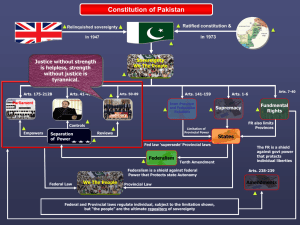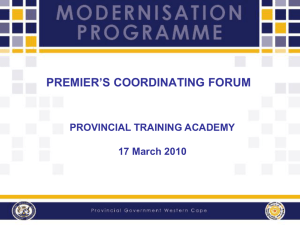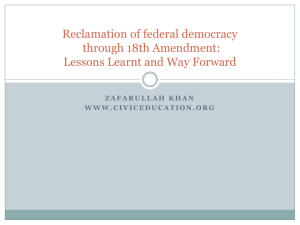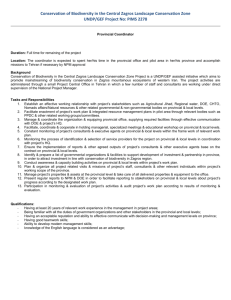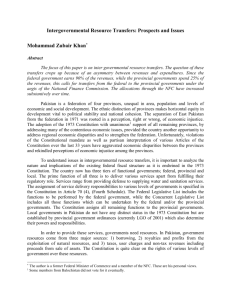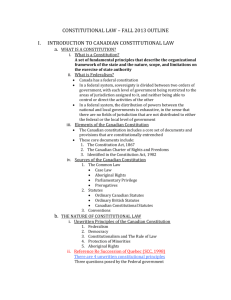Maximizing Benefits for Devolution, The News, July 25, 2011
advertisement
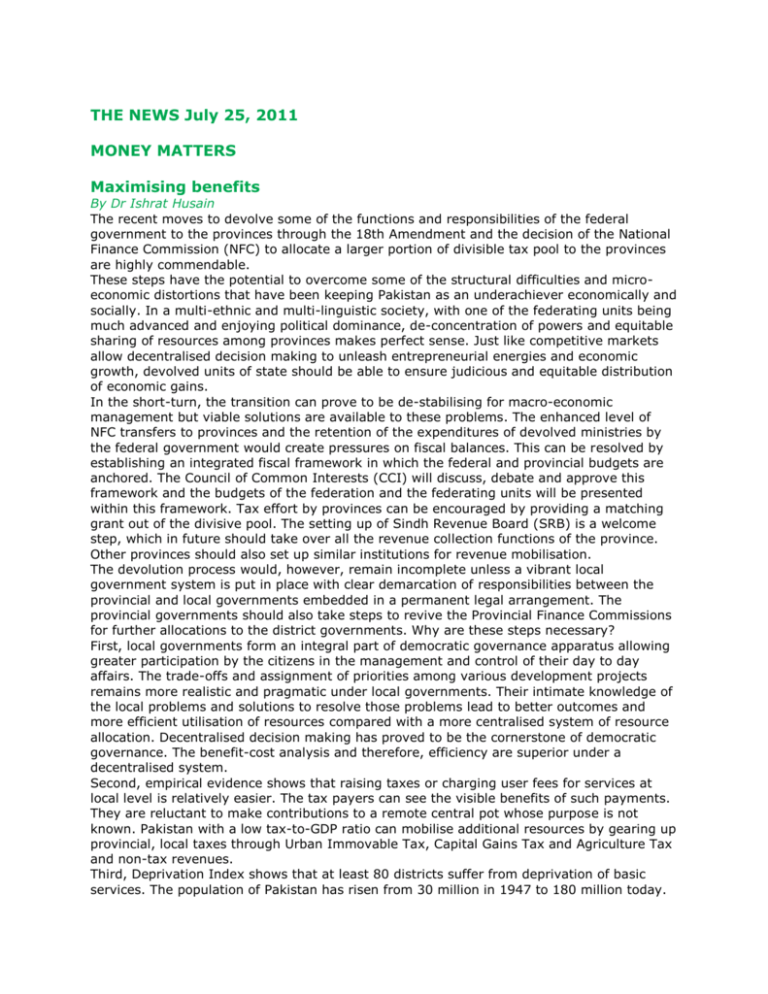
THE NEWS July 25, 2011 MONEY MATTERS Maximising benefits By Dr Ishrat Husain The recent moves to devolve some of the functions and responsibilities of the federal government to the provinces through the 18th Amendment and the decision of the National Finance Commission (NFC) to allocate a larger portion of divisible tax pool to the provinces are highly commendable. These steps have the potential to overcome some of the structural difficulties and microeconomic distortions that have been keeping Pakistan as an underachiever economically and socially. In a multi-ethnic and multi-linguistic society, with one of the federating units being much advanced and enjoying political dominance, de-concentration of powers and equitable sharing of resources among provinces makes perfect sense. Just like competitive markets allow decentralised decision making to unleash entrepreneurial energies and economic growth, devolved units of state should be able to ensure judicious and equitable distribution of economic gains. In the short-turn, the transition can prove to be de-stabilising for macro-economic management but viable solutions are available to these problems. The enhanced level of NFC transfers to provinces and the retention of the expenditures of devolved ministries by the federal government would create pressures on fiscal balances. This can be resolved by establishing an integrated fiscal framework in which the federal and provincial budgets are anchored. The Council of Common Interests (CCI) will discuss, debate and approve this framework and the budgets of the federation and the federating units will be presented within this framework. Tax effort by provinces can be encouraged by providing a matching grant out of the divisive pool. The setting up of Sindh Revenue Board (SRB) is a welcome step, which in future should take over all the revenue collection functions of the province. Other provinces should also set up similar institutions for revenue mobilisation. The devolution process would, however, remain incomplete unless a vibrant local government system is put in place with clear demarcation of responsibilities between the provincial and local governments embedded in a permanent legal arrangement. The provincial governments should also take steps to revive the Provincial Finance Commissions for further allocations to the district governments. Why are these steps necessary? First, local governments form an integral part of democratic governance apparatus allowing greater participation by the citizens in the management and control of their day to day affairs. The trade-offs and assignment of priorities among various development projects remains more realistic and pragmatic under local governments. Their intimate knowledge of the local problems and solutions to resolve those problems lead to better outcomes and more efficient utilisation of resources compared with a more centralised system of resource allocation. Decentralised decision making has proved to be the cornerstone of democratic governance. The benefit-cost analysis and therefore, efficiency are superior under a decentralised system. Second, empirical evidence shows that raising taxes or charging user fees for services at local level is relatively easier. The tax payers can see the visible benefits of such payments. They are reluctant to make contributions to a remote central pot whose purpose is not known. Pakistan with a low tax-to-GDP ratio can mobilise additional resources by gearing up provincial, local taxes through Urban Immovable Tax, Capital Gains Tax and Agriculture Tax and non-tax revenues. Third, Deprivation Index shows that at least 80 districts suffer from deprivation of basic services. The population of Pakistan has risen from 30 million in 1947 to 180 million today. There is no way that such a large population can be served from Islamabad or the four provincial capitals. The peculiar circumstances and needs of each district require an understanding of its problems and the design of interventions that can address those problems. Only the local governments with greater participation of the inhabitants can plan and execute projects and mobilise resources needed to finance them. A provincial government is too big a unit to be able to carry out local projects in any meaningful way. Fourth, it has been observed that access to basic services in Pakistan can be obtained either through money or by approaching the elected representatives. Members of National Assembly or Provincial Assembly mostly remain away from their constituencies and are not always easily accessible. The local government nazims and councilors, on the contrary, spend most of their time within areas from where they are elected and an ordinary citizen can access them easily. Some visible improvements were seen in access to services after the 2001 local government system. A system in which the bureaucrats control the development departments provide neither access nor accountability for results. The elected nazims and councilors have to be responsive because they could lose their offices if they were unable to deliver. Fifth, the increased representation of the neglected segment of the society i.e. the female population in the local government system had made participation more broad-based. Political empowerment of women is the first step towards the path of generating greater economic opportunities and contribution to economic uplift. Given the interest of the female representatives in the social sectors, education, health, water and sanitation got better attention and resources under the vigilant watch of women councilors. There were many disadvantages of the 2001 system that needed to be rectified or removed. First, the district nazims were elected indirectly by the union nazims and were thus beholden to them and served at their pleasure. Most of the time the budgetary allocations were made not on the basis of priorities of the district as such but the preferences of the union nazims. To avoid this, the district nazims should be elected by the population on the basis of adult franchise. Second, the powers of law and order, revenue records and disaster management should not reside with the district nazims as their decisions are mostly driven by partisanship and narrow parochial considerations. These functions can best be performed by competent, neutral and non-political civil servants, who are trusted by all the citizens across the political spectrum. The weakening of law enforcement system, the tampering of land revenue records and the poor management of national disasters became too apparent after 2001. The district coordination officers should be assigned these functions. Third, there was no administrative linkage between the union, tehsil and district governments. Each tier was supposed to work independent of each other and consequently the lack of coordination among various agencies led to inefficient outcomes. The district nazim, being the head of the local government, should have statutory and legal powers to convene, consult, and give directions to the tehsil nazim or union nazim for resolving problems and conflicts that are cross jurisdictional. Fourth, the accountability of the local governments proved to be perfunctory and almost non-existent. The provincial governments did not exercise effective control of departments devolved to the districts. As the powers of recruitment, transfers and postings, and disciplinary actions continued to remain vested in the provincial departments, the diarchy proved to be fatal for effective functioning of the devolved departments. Corruption at the district government level could not be contained due to inadequate supervisory arrangements evolved by the provincial governments. The 18th Amendment has strengthened the Auditor General of Pakistan and the provincial governments should use the Auditor General and strengthen the monitoring and accountability of the local governments. The provincial governments should also be responsible for all the regulatory functions, including setting the standards. To conclude, one observer has aptly pointed out that “where there is a vibrant centre of power but impotent to impact the far reaches of the societal rim, alienation occurs.” Pakistan can no longer afford any further alienation in its society. n The writer is Dean and Director, Institute of Business Administration and former governor of State Bank of Pakistan.
